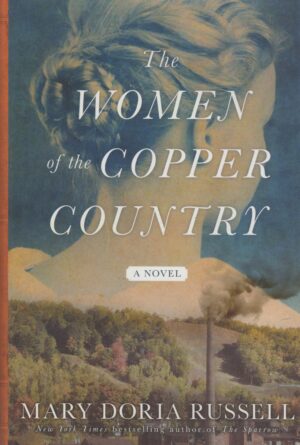
The Women of Copper Country by Mary Doria Russell (2019. Atria. ISBN 978-1-9821-0958-5)
I love the Upper Peninsula of Michigan. I’ve spent many days and nights there, attending Finnish festivals, signing books at North Wind Bookstore (formerly attached to Finlandia University), giving interviews about my Finnish trilogy, and lecturing on writing and my use of history to tell a story. The third book of my trilogy, Kotimaa: Homeland, follows much of the same historical arc as this book, though the main female character in Russell’s work doesn’t appear in mine. That’s curious, I guess. So when I saw that the Keweenaw Community Foundation was raising money for a statue to one of the UP’s most beloved and iconic women, labor leader Annie Klobuchar Clements, I had to attend. My wife and I took a break from my political campaign and stayed five nights at the Houghton, MI municipal RV park right next to the Keweenaw waterway (Portage Lake) and made the short drive to Calumet for the gala. It was a stunning event with great food, people, history, and music. This book (an author signed copy) was in the silent auction, along with a collage created by its author and I was the lucky winner!
In essence, this is historical fiction featuring Big Annie (as she was known) during the 1913 Copper Strike. It is not, as the title suggests, really about the other women involved in the labor dispute except as very minor, adjunct, characters to Big Annie. Oh, there are snapshots of other female characters inhabiting the tale but none of them occupies center stage in the manner of the chief protagonist. That’s OK. However, there’s a bit of hero worship going on here, with the author drawing Annie’s already impostng physical and moral stature even grander and more important than the role history affords her. Again, not a real issue, though the praising of Annie’s moral fiber and grit seems a bit exaggerated. So too is the main antagonist’s fate.
James MacNaughton, the principal of the Calumet mine where Annie’s husband and thousands of other men toiled beneath ground to extract copper for their masters, is not given much in the way of characterization beyond being a greedy, evil, SOB. Whether or not his callousness and vitriol towards immigrants and their children is real or imagined, the fact that there’s not a more nuanced approach to his persona and actions seems forced. That’s my major critique of the story and the writing: with the exception of Hitler, Stalin, and some other notable historical figures, most men are not pure evil. They are more nuanced and more complex than such a simple demarcation. But it’s within an author’s purview to tell his or her story as he or she sees fit. If it’s a tad tilted against reality, so be it.
In the end, the forces of good (Annie and the miners) and evil (MacNaughton and his thugs) plays out fairly well against the reality of history. I liked the book. I wanted to love the book but that didn’t happen. Still, a worthy read.
Peace
Mark
4 stars out of 5. A good book for a book club to read and discuss against the backdrop of today’s resurgence of unionism.


